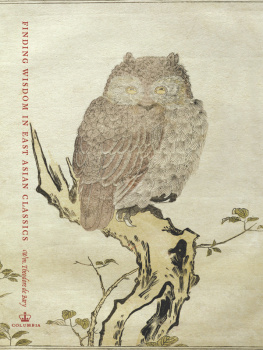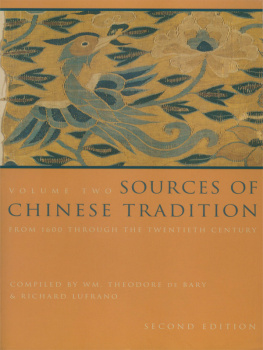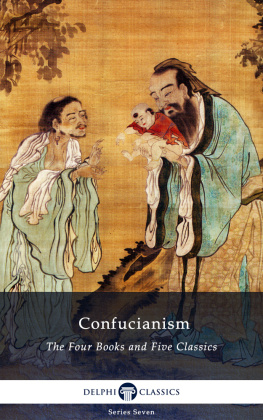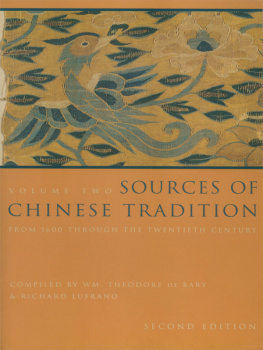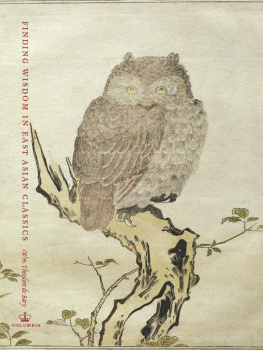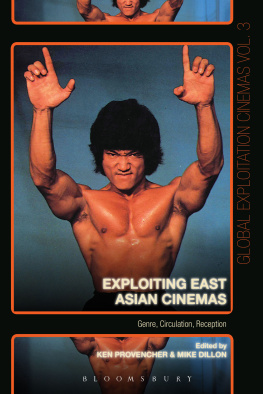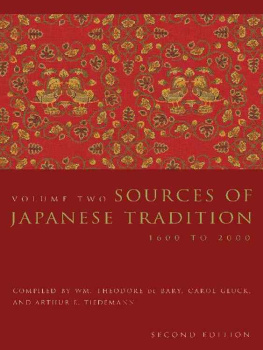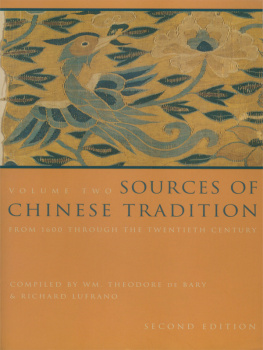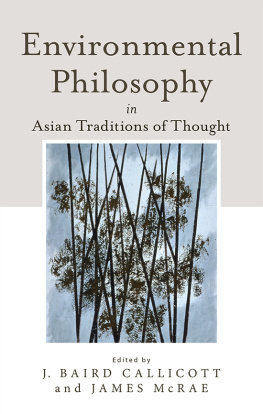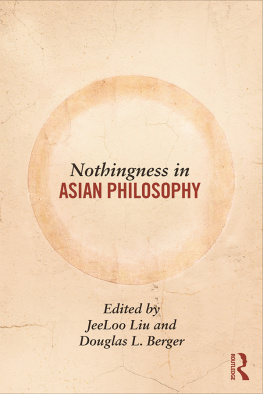FINDING WISDOM IN
EAST ASIAN CLASSICS
FINDING WISDOM IN
EAST ASIAN CLASSICS
Edited by Wm. Theodore de Bary
COLUMBIA UNIVERSITY PRESS New York

COLUMBIA UNIVERSITY PRESS
PUBLISHERS SINCE 1893 NEW YORK CHICHESTER, WEST SUSSEX
cup.columbia.edu
Copyright 2011 Columbia University Press
All rights reserved
E-ISBN 978-0-231-52719-4
Library of Congress Cataloging-in-Publication Data
Finding wisdom in East Asian classics / edited by Wm. Theodore de Bary.
p. cm.
Includes index.
ISBN 978-0-231-15396-6 (cloth : alk. paper ISBN 978-0-231-15397-3
(pbk. : alk. paper) ISBN 978-0-231-52719-4 (ebook)
1. East Asian literatureHistory and criticism. 2. Wisdom in literature. 3. Best booksEast Asia. 4. Canon (Literature) I. De Bary, William Theodore, 1919
PL493.F56 2011
895dc22
2010053572
A Columbia University Press E-book.
CUP would be pleased to hear about your reading experience with this e-book at .
References to Internet Web sites (URLs) were accurate at the time of writing. Neither the author nor Columbia University Press is responsible for URLs that may have expired or changed since the manuscript was prepared.
The frontispiece (p.ii) shows Zhou Dunyis Diagram of the Supreme Ultimate, with the Diagram of the Study of the Mind (Diagram of the Study of the Heart-and-Mind) on page x. The diagrams are discussed on pages 336 and 348 and are from Michael Kaltons To Become a Sage (New York: Columbia University Press, 1988), 39 and 161.
To Irene Bloom
Anne Whitney Olin Professor of Asian and Middle Eastern Studies at Barnard College, 19892002. An outstanding scholar, inspiring teacher, and beautiful friend to all who knew her at Barnard and Columbia.
CONTENTS

T HOSE FAMILIAR WITH the early history of the movement at Columbia identified with the Honors Course of John Erskine (18791951) and The Classics of the Western World, known later in Chicago and St. Johns as the Great Books Program, will recall how its early advocates, including, among others, Mark Van Doren and Stringfellow Barr, referred to the dialogue among the great writers and thinkers as The Great Conversation. They thought of it as the great minds speaking to each other over the centuries about the perennial issues of human life and society. Contrary to those who misperceived the process as one of handing down fixed, eternal truths, for them it was a vital process of reengaging with questions that had continued to have human relevance, age after age. One could not afford to ignore what had earlier been said about those issues, because civilization depended on building upon the lessons of the past. Thus tradition, like civilization, continued to grow. It was cumulating and cumulative, not fixed.
Not all of the issues engaged in this conversation had to do with civilization and societysome religious issues might go beyond thatbut sustaining the conversation itself required a civilized life, a willingness to show a decent respect for what others have learned or thought for themselves, what others have valued or held dear. Indeed, it was an appreciation for human life as it has been lived.
In the earlier phases of this movement, the conversation remained largely within the Western tradition and was closely tied to the question of how classics, originally expressed in the classical languages of the West, especially Latin and Greek, could survive in the modern vernacular as part of a classical education. But it was easily assumed that translation into the vernacular was possible because of the continuity of both language and culture into the later period. Such continuity in cultural values overrode historical change. As we shall see, this was largely (but not entirely) true of the major Asian traditions as well. They too had long-standing traditions of a Great Conversation, as later writers spoke to and reappropriated their own classicsand thus engaged with the great minds of the past.
It was not, however, a matter simply of conserving received tradition. It was, as the word conversation suggests, the present speaking to the past in its own voice, actively repossessing and renewing the classics in modern terms that spoke to contemporary concerns as well. In other words, these traditions had within themselves the capacity for reexamination and selfrenewal.
In modern times, this meant reflecting on the classics in a way that responded to the new cultural situation in which modern writers found themselves. By the eighteenth century at least, Western writers recognized that Asian traditions had classic thinkers who spoke to the same issues and concerns, though perhaps in somewhat different terms. Thus Enlightenment thinkers began to speak to the thinkers of classical China as well as to Western classics, and the New England Transcendentalists spoke also to philosophers of ancient India. Benjamin Franklin, at the founding of the American Philosophical Society, dedicated it to the study of Chinese as well as Western philosophy. All this had an effect on early twentieth-century writers such as W. B. Yeats, Ezra Pound, T. S. Eliot, and many others. But as of the twentieth century, though the most creative minds were already extending the Great Conversation to Asia, it had as yet little effect on Western education at the basic level. Asian classics did not become part of the Great Books program. They were not among Mortimer Adlers Hundred Great Books, nor did his Hundred Great Ideas include any Asian concepts.
Another limitation on the inclusion of Asian classics in the Great Conversation as conducted in the modern West was the tendency to focus the conversation on the classic writers of the Asian traditions, but not as part of a continuing conversation over time that matured well beyond ancient times. Thus Ezra Pound thought he could directly engage with the Confucian classics and even translate them himself with minimal Sinological expertise. Sometimes he succeeded brilliantly in intuiting and appropriating them for his own poetic purposes, but this falls well short of explaining what the Analects or Great Learning had meant to later Chinese, Japanese, and Korean civilizations. In other words, it was more of an extension of Pounds own culture, his own exploratory venture into the past idealizing Confucianism, than it was a substantial engagement with Chinese culture or civilization in its mature forms.
The time has come, however, for us to extend the conversation to twenty-first-century education in ways that do justice to Asian classics not just as museum pieces but as part of the historical process of the emerging world civilization. Given the domination of education today by economic and technological forcesthe same forces that drive world businessthis will not be an easy thing to do. Indeed, the preservation of any humanities education at all is problematic now anywhere in the world. I have written elsewhere about the crisis in East Asian education as modern universities have found it difficult to sustain the reading of even their own classics in the undergraduate curriculum. But the reasons for it are the same as those that militate against any classical education at all, even in the West. For the most part, Chinese or Japanese classics are read only by a few students majoring in classics departments. Meanwhile, most students want to concentrate on economics, science, and technology, and for these English is the relevant language. Thus the problem for Asian education is little different from that in the West: how to sustain any place at all for the humanities in the curriculum. It is a global problem and everywhere raises the question: can traditional humanistic learning be sustained as part of a new global culture, which would otherwise be dominated simply by the market and technology?

